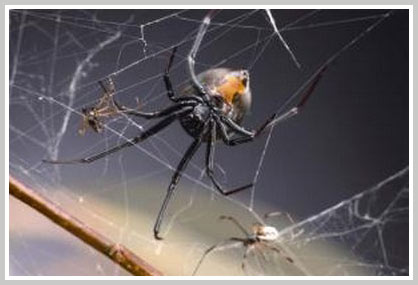Torn apart because of love
The red-backed female spiders are usually very aggressive and ready to tear apart male spiders who are unable to mate for a long time.
Jeffrey Stoltz and colleagues at the University of Toronto Scarborough (Canada) studied courtship behavior of red-backed spiders. They let some female spiders live with male spiders and follow their courtship and mating process. The monitoring results show that the maximum time of male male spiders is 5 hours.
Before attempting to mate, they catch the attention of the opponent by tugging on the spider's web or hitting her back . During mating, the female spider is always ready to eat male spider meat. But if there is only one male spider, the probability of her sparing her partner's life is about 90%.
But if another male spider appears, the story will be different. When there are 2 spiders who want to approach a female spider, the smaller spider usually takes advantage of the opponent's loophole to climb up the female's back and mate quickly with an average of 45 minutes. The female spider does not seem to be interested in the type of " fighting guerrilla " and often grabs clever guys to beat the cup. The probability of fast mating spiders being eaten is about 50%.

A male spider is trying to approach a female spider while another male leaves.(Photo: Newscientist)
'Chats help spiders know how tough your partner is. According to our inference, mating time is directly proportional to spider health. Spiders like to kill male spiders 'love' quickly so they don't have a chance to mate again. In doing so, they prevent weak spiders from spreading genes for later generations. This is beneficial in terms of evolution, " said researcher Jeffrey Stoltz.
The mating behavior of red-backed spider mites decreases if the males are nearly equal in size. In that case, the probability of the male being eaten reduced to 35% after the first encounter. However, if the life of a weak male is spared, the female spider will eliminate the possibility that it will become the father of the spiders by mating with another male.
- 9 odd effects of love
- Strange facts that science explains about love
- 4 wrong thoughts about love that not everyone knows
- New discoveries of love
- Interesting facts about love
- 'What is love?' through a scientific perspective
- 4 new discoveries about love that amaze you
- How many seconds do women need to have love?
- Why are people 'blind' when they love?
- Love is like an addiction
- Psychological reactions after being confessed
- Sad love story behind the love locks around the world
 Why do potatoes have eyes?
Why do potatoes have eyes? 'Tragedy' the world's largest carnivorous life: Death becomes ... public toilet
'Tragedy' the world's largest carnivorous life: Death becomes ... public toilet Tomatoes were once considered 'poisonous' for 200 years
Tomatoes were once considered 'poisonous' for 200 years Detecting microscopic parasites on human face
Detecting microscopic parasites on human face